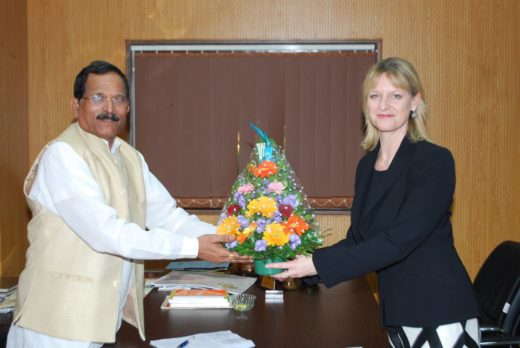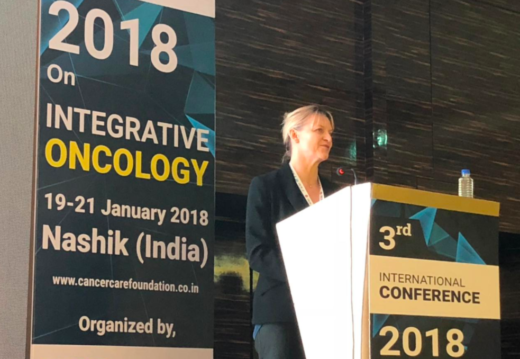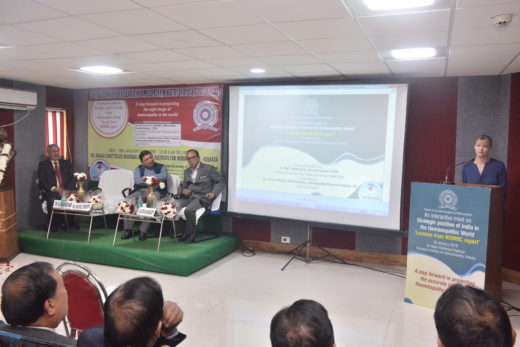HRI strengthens links with India
10 апреля 2018In January 2018, Rachel Roberts (HRI Chief Executive), was delighted to accept an invitation extended by the Government of India for a two-week visit, organised by the Central Council for Research in Homoeopathy (CCRH), Ministry of AYUSH.
The multi-state itinerary, hosted by Dr Raj Manchanda (Director General, CCRH), provided the opportunity for Rachel to learn more about the homeopathy sector in India, particularly how homeopathy has been successfully incorporated into public healthcare.
 Rachel was honoured to meet with Shri. Shripad Yesso Naik, Minister of State (IC), Ministry of AYUSH, at his offices in Goa. Rachel commended the Indian Government on its adoption of a fully integrated healthcare model, for which it is held in high regard by the international homeopathic community. As she put it to the Minister, “India is a fine example of how safe, effective low-cost ‘alternative’ treatments such as homeopathy can be provided alongside conventional medicine. With this kind of integrated approach everyone wins – patients have true freedom of choice in their healthcare and benefit clinically from taking fewer pharmaceutical drugs, whilst the Government benefits from reduced drug bills”.
Rachel was honoured to meet with Shri. Shripad Yesso Naik, Minister of State (IC), Ministry of AYUSH, at his offices in Goa. Rachel commended the Indian Government on its adoption of a fully integrated healthcare model, for which it is held in high regard by the international homeopathic community. As she put it to the Minister, “India is a fine example of how safe, effective low-cost ‘alternative’ treatments such as homeopathy can be provided alongside conventional medicine. With this kind of integrated approach everyone wins – patients have true freedom of choice in their healthcare and benefit clinically from taking fewer pharmaceutical drugs, whilst the Government benefits from reduced drug bills”.
The Minister expressed his appreciation for Rachel’s intention to share her experience working with homeopathy research and strategy at an international level with her Indian counterparts, and offered the full support of the Ministry during her time in India.
 Rachel was delighted to begin her trip by making a Keynote address at the 3rd International Conference on Integrative Oncology in Nasik, followed by a visit to the laboratory of Professor Jayesh Bellare (Indian Institute of Technology, Mumbai), to discuss his internationally renowned work in the field of fundamental research.
Rachel was delighted to begin her trip by making a Keynote address at the 3rd International Conference on Integrative Oncology in Nasik, followed by a visit to the laboratory of Professor Jayesh Bellare (Indian Institute of Technology, Mumbai), to discuss his internationally renowned work in the field of fundamental research.
A series of six public events held at such prestigious venues as the AYUSH auditorium (Delhi), National Institute of Homoeopathy (Kolkata) and National Homeopathy Research Institute in Mental Health (Kerala), were attended by Government representatives, researchers, practitioners, educators and students. The aim of these meetings was to discuss strategies for promoting an accurate image of homeopathy on a global level.
 Whilst highlighting HRI’s work in promoting and disseminating high quality research, Rachel gave an in-depth summary of the situation with the Australian NHMRC report on homeopathy. She explained how breaches of usual scientific methods and procedure by the Australian researchers had led to the report’s inaccurate findings, as well as giving updates on steps being taken to have the report formally retracted.
Whilst highlighting HRI’s work in promoting and disseminating high quality research, Rachel gave an in-depth summary of the situation with the Australian NHMRC report on homeopathy. She explained how breaches of usual scientific methods and procedure by the Australian researchers had led to the report’s inaccurate findings, as well as giving updates on steps being taken to have the report formally retracted.
Rachel additionally made the Indian community aware of the Water Research Lab (www.WRL-Lab.org) — a new physics laboratory in Germany, partly funded by the Homeopathy Research Institute. WRL has been launched to explore the properties of water, potentially explaining the mechanism of action for homeopathy.
Several key Indian representatives spoke in support of the need for improvement in the quality of education, standard and volume of research and the increasing need for enhanced global collaboration.












